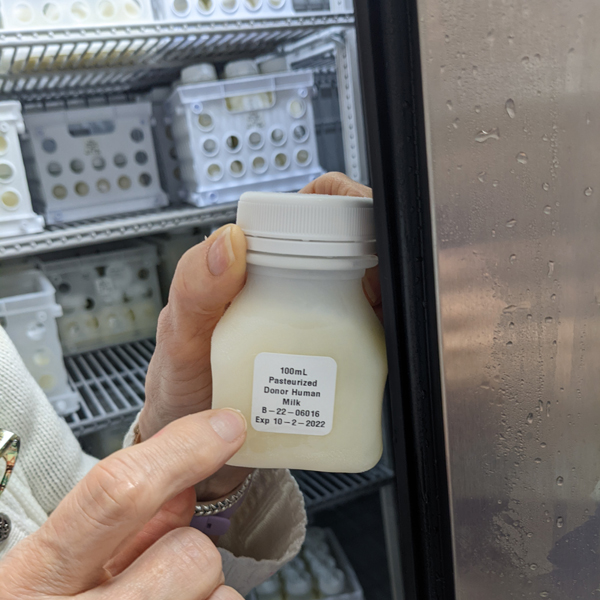
Photos by Laura Lindsay
Moms in Rutherford County and across the state are donating their milk to Mothers’ Milk Bank of Tennessee. After the milk is pasteurized, it is delivered to preemie babies in neonatal units across the state.
Mothers’ Milk Bank is a member milk bank of the Human Milk Banking Association of North America (HMBANA). This milk bank, located in Murfreesboro, opened in November 2021, picking Murfreesboro as its location because it is the center of the state of Tennessee.
Mothers’ Milk Bank of Tennessee Director Dr. Susan Campbell, IBCLB, is a neonatologist and a lactation specialist.
“I was working full-time as a doctor up until 2021 at hospitals in the Middle Tennessee region,” Campbell said. “I took care of sick babies in the NICU and saw the need for and benefit of pasteurized donor human milk.
“The milk bank’s whole reason for being is that we want babies to thrive, and we want every baby in the state who needs breast milk to have it, starting with the most vulnerable babies in the NICUs. We can’t serve all the babies who need it yet, but that is our hope for the future. We are hoping next year to put together an outpatient program. We need to make sure we will have sufficient milk to do so.”
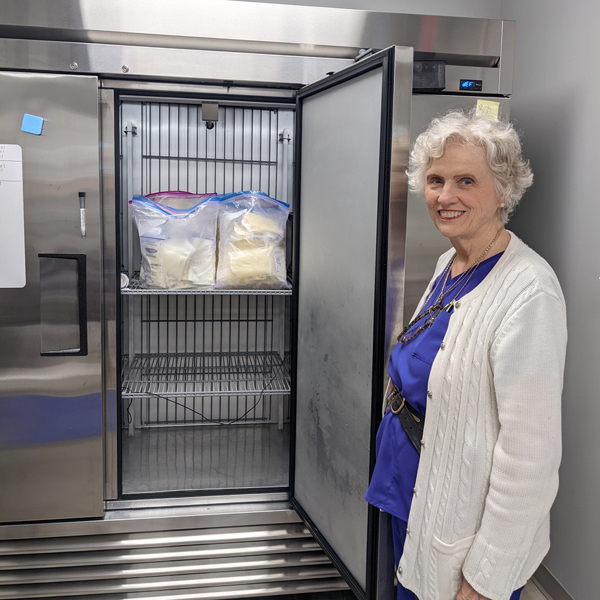
Susan Campbell Executive Director Mothers Milk Bank of Tennessee
Campbell said milk banks have been around since the early 1900s. The first milk bank was in Vienna in 1909, and the second one was in Boston in 1910.
“When milk banks were first starting, the main focus of all milk banks was to save vulnerable babies’ lives first and foremost. Today if milk banks have extra milk or milk that is a little low in calories for hospitalized babies, that milk may be released for outpatients,” the local milk bank director said. “We have not started our outpatient program yet, which breaks my heart because I would love to be able to help all of the moms who need milk for their babies. A lot of the more established milk banks are able to support outpatient programs.”
Campbell said the recent formula shortage has been absolutely devastating.
“It’s been devastating for us because we are not ready yet to help supply milk for parents at home,” Campbell said.
But the milk bank’s secondary mission is to promote and support breastfeeding across the state.
“One of the main health issues in Tennessee is that we have one of the lowest breastfeeding rates in the country,” she said.
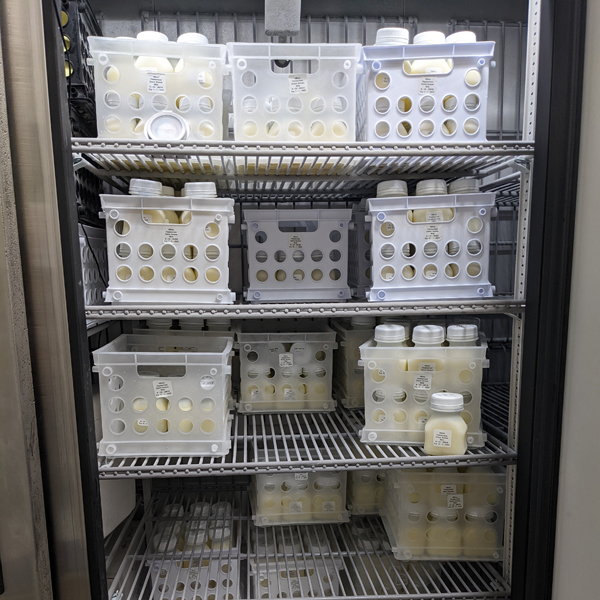
“We have moms who call us and say they really need some milk because their milk supply is dropping. So we try to connect them with some support. This may be linking them up with the breastfeeding hotline, which we are very fortunate to have in Tennessee, where any mother any time of the day can call, and they can talk to a board certified lactation consultant, who can talk the mother through some things with suggestions to improve their supply, which moms can do,” Campbell continued.
Campbell says one thing that concerns her is moms who want to share their breast milk.
“Because breast milk, if it is not pasteurized, can have bacteria and viruses in it that can be detrimental to a baby. Even though you may have a very dear friend and you trust them implicitly, there still could be something that gets transmitted. We tell the mothers whom we approved as donors that just because we have approved them as donor doesn’t mean it is safe for them to give their raw milk to somebody else. If we pasteurized the milk, we still culture it afterwards to be certain it is absolutely safe.”
Right now, even while Mothers’ Milk Bank is only supplying milk to the hospitals, growth has resulted in an increasing size of orders.
“We have gone from 30 bottles on our first delivery to 660 bottles in a recent shipment,” Campbell said.
Campbell said the milk bank is serving hospitals as far away as Regional One in Memphis and Erlanger in Chattanooga, plus a lot of Middle Tennessee hospitals. On the day in June when she spoke with the Murfreesboro Pulse, the milk bank had just shipped out 610 bottles of milk that went to four different hospitals.
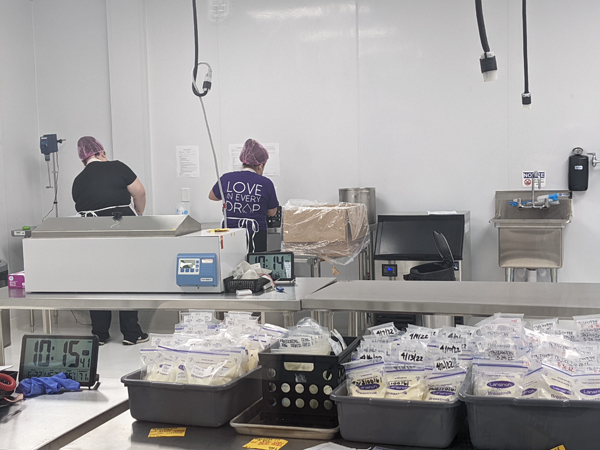
Ashley Jones, Pasteurization Technician (left), Christina Vargo, Pasteurization Lab Supervisor
“Here at our location, the moms can drive up and bring their donated bags of milk. They have to be screened and approved as a donor before they donate milk,” she said. “The mothers can be on certain types of medications temporarily, and that may trigger what we call a deferral. For example, we can’t take a mother’s milk when she is on antibiotics because our end users are the babies in the NICUs. Giving them those strong antibiotics could be detrimental. So we would assign her a deferral date until it is out of her system.”
After the Mothers’ Milk Bank team checks for deferrals, the milk goes into the milk bank to begin the pasteurization.
The bank mixes five different mothers’ milks together and then pours it into bottles.
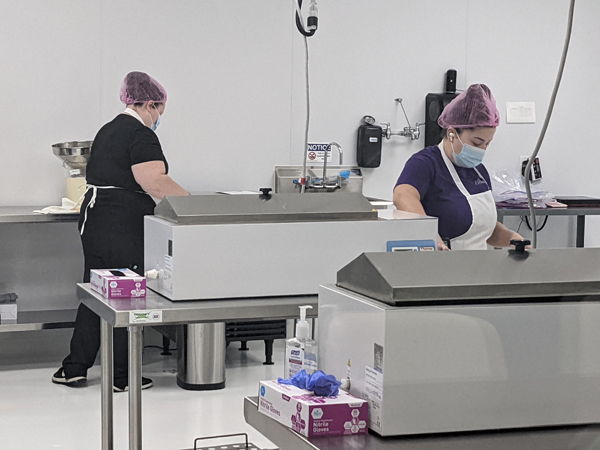
“We mix five mothers’ milks together because mothers get exposed to different things, and their milk has antibodies specific to their experience in it. So if we mix five together, it makes it more robust. The tiny baby is getting more exposure to antibodies to protect against infections,” Campbell said. “A lot of people are worried about COVID and some other viral and bacterial illnesses. The bacteria and viruses are destroyed by the pasteurization process. But the antibodies are not, which is wonderful because they can protect the baby.”
Once the milk has been cleared as safe to use, it is moved to the shipping freezer where it is kept under rigid temperature control until it is shipped.
That is when Susan’s husband, Bruce Campbell, steps in.
“My husband is our milkman,” she said. “He takes the milk to the hospitals and picks up any donated milk mothers have dropped off there.”
For more information on Mothers’ Milk Bank of Tennessee, visit milkbanktn.org or email susan.campbell@milkbanktn.org.
For help with breastfeeding questions, call the Breastfeeding Hotline at 855-423-6667.









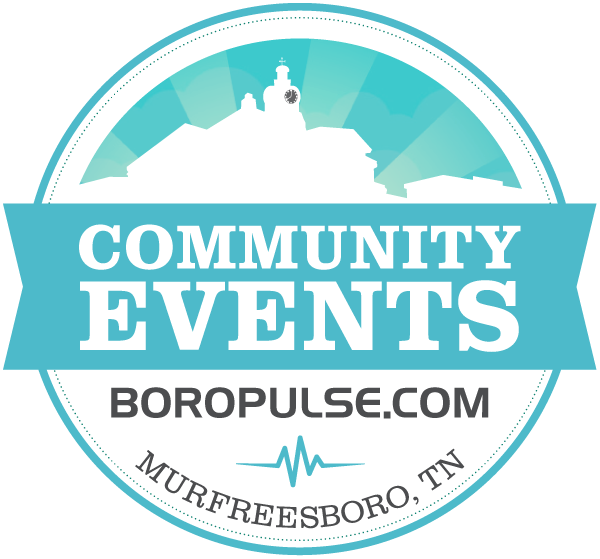




This article doesn’t address the effect of pasteurization on naturally occurring vitamins and minerals In colostrum and breast milk. Please direct me to a recent article containing this info. Thank You
Comment August 5, 2022 @ 2:29 pm